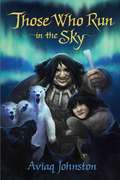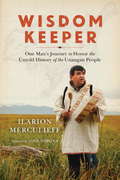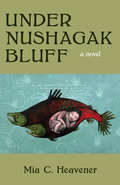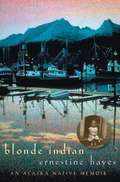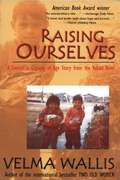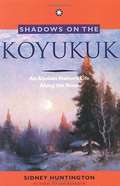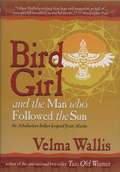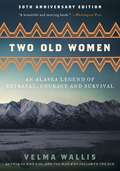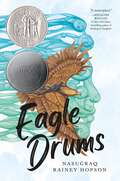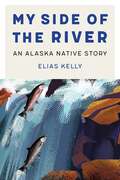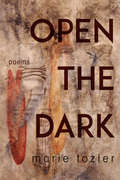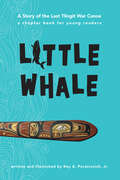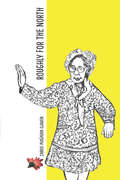Special Collections
Alaskan Native Authors
- Table View
- List View
Those who run in the sky
by Aviaq Johnston and Neil Christopher and Kelly WardAfter a strange and violent blizzard leaves young shaman-in-training Pitu stranded on the sea ice--without his dog team or any weapons to defend himself--he soon realizes that he is no longer in the word that he once knew. The storm has carried him into the world of the spirits, a world populated by terrifying creatures. As he tries to find his way back home, Pitu is plagued by black wolves constantly stalking him, water-dwelling creatures that want to snatch him and pull him into the frigid ocean through an ice crack, as well as beings less frightening, but equally as incredible, such as a lone giant who can carry Pitu in the palm of her hand and keeps caribou and polar bears as pets. After stumbling upon a fellow shaman who has been trapped in the spirit world for many years, Pitu must master all of his shamanic powers to make his way back to the world of the living, to his family and to the girl that he loves. For junior and senior high readers. 2017.
Wisdom Keeper
by Nina Simons and Ilarion MerculieffIlarion Merculieff weaves the remarkable strands of his life and culture into a fascinating account that begins with his traditional Unangan (Aleut) upbringing on a remote island in the Bering Sea, through his immersion in both the Russian Orthodox Church and his tribe's holistic spiritual beliefs. He recounts his developing consciousness and call to leadership, and describes his work of the past thirty years bringing together Western science and Indigenous peoples' traditional knowledge and wisdom to address the most pressing issues of our time.
Tracing the extraordinary history of his ancestors--who mummified their dead in a way very similar to the Egyptians, constructed one of the most sophisticated high seas kayaks in the world, and densely populated shorelines in North America for ten thousand years--Merculieff describes the rich traditions of spirituality, art, dance, music, storytelling, science, and technology that enabled them to survive their harsh conditions. The Unangan people of the Aleutian Islands endured slavery at the hands of the U.S. government and were placed in an internment camp during WWII, where they suffered malnutrition and disease that decimated 10 percent of their population. Merculieff movingly describes how the compassion of Indigenous Elders has guided him in his work and life, which has been rife with struggle and hardship. He explains that environmental degradation, the extinction of species, pollution, war, and failing public institutions are all reflections of our relationships with ourselves. In order to deal with these critical challenges, he argues, we must reenter the chaos of the natural world, rediscover our balance of the masculine and the sacred feminine, and heal ourselves. Then, perhaps, we can heal the world.
Under Nushagak Bluff
by Mia C. HeavenerIn 1939, everything changes for Anne Girl when outsider John Nelson grounds his sailboat on the shores, into Anne Girl’s skiff, and into her life during a rare storm in the Alaskan fishing village of Nushagak. When Anne Girl and her mother Marulia find their skiff flattened by John’s boat, Anne Girl decides she both hates and wants him. Thus begins a generational saga of strong, stubborn Yup’ik women living in a village that has been divided between the new and the old, the bluff side and the missionary side, the cannery side and the subsistence side.
The Igloo
by Charlotte Yue and David YueFocusing on the igloo, this book also covers many other aspects of traditional Eskimo life. These include hunting, the making of tools, and travel by boat and dogsled. This book is exceptionally well researched (as reflected in its extensive bibliography) and may be of value to adults as well as young readers ISBN 0-395-4463-9 .
Blonde Indian
by Ernestine HayesBorn in Juneau, Alaska, Ernestine Hayes (English, U. of Alaska Southeast) is a member of the Wolf House of the Kaagwaantaan clan of the Lingit. In this memoir, she uses vivid dialogue to tell the story of her girlhood, her travels as a young woman, and her return home as an adult. She also reveals her inner struggle as an individual who is neither fully Native American nor Euro-American.
Raising Ourselves
by Velma WallisBorn in 1960, the sixth of thirteen children, Velma Wallis comes of age in a two-room log cabin in remote Fort Yukon, Alaska. Life is defined by the business of living off the land. Chopping wood. Hauling water from the river. Hunting moose. Catching salmon. Traping fur. Taking care of the dogs. For a thousand years, the Gwich'in clan had followed migratory animals across the north. But two generations before, the people had settled where the Porcupine River flows into the Yukon. Now, the Wallis family has a post office box and an account at the general store, and Velma listens to Wolf Man Jack on armed forces radio. The author discovers that her people have surrendered their language, traditional values, and religion to white teachers, traders, and missionaries. Flu epidemics have claimed many loved ones. Village elders seem like strangers from another land, and in a way they are. There is much drinking when the monthly government checks come, and that is when the pain comes out of hiding. RAISING OURSELVES is a gritty, sobering, yet irresistible story filled with laughter even as generations of Gwich'in grief seeps from past to present. But hope pushes back hopelessness, and a new strength and wisdom emerge.
Shadows On The Koyukuk
by Sydney Huntington and Jim ReardonJim Reardon: "Shortly after 1900, Klondike gold rusher James S. Huntington wandered down the Yukon River, where he met and married Anna, a Koyukon daughter of the land. Their son Sidney has now lived for three-quarters of a century in the Koyukuk country where he was born. His life's story is a fascinating slice of Alaskan history. Sidney grew up in a subarctic wildland of birchbark canoes, dog teams, trappers, gold miners, and Koyukon Indians. He continues to live in essentially the same culture, now modernized with snow machines, bush planes, and satellite TV. He is a product of the land, who thoroughly knows his region, the animals, and the people who live there. The memories he shares in this book bring alive a way of life that is gone forever, for as a teenager and young man he lived primarily off the land; his interest in traditional Koyukon tales provides an intriguing peek into Koyukon Indian prehistory. In addition to leading an incredibly adventurous life, Huntington is a special kind of person. His is a bootstraps-up, inspirational success story of survival. Despite this, Sidney has always found time to help othersa trait that in recent years has brought him statewide respect and an honorary doctorate from the University of Alaska. Long before he received that degree, I regarded Sidney as holding a doctorate in life, for he is self-educated, with knowledge that extends far beyond the horizons of Alaska's Koyukuk country." Note to parents: a few hells and damns pepper the dialogue in this book.
Bird Girl and the Man Who Followed the Sun
by Velma WallisIn her spellbinding second book, the award-winning author interweaves two classic Athabaskan legends set in ancient central Alaska. This is the story of two rebels who break the strict taboos of their communal culture in their quests for freedom and adventure. Readers will be captivated by this profound myth about two young people who wander far from their culture's deeply held traditions and eventually must find a way to come home again. Wallis's first book, TWO OLD WOMEN, is an international best-seller, translated into seventeen languages.
Two Old Women
by Velma WallisBased on an Athabascan Indian legend passed along for many generations from mothers to daughters of the upper Yukon River Valley in Alaska, this is the suspenseful, shocking, ultimately inspirational tale of two old women abandoned by their tribe during a brutal winter famine. Though these women have been known to complain more than contribute, they now must either survive on their own or die trying. In simple but vivid detail, Velma Wallis depicts a landscape and way of life that are at once merciless and starkly beautiful. In her old women, she has created two heroines of steely determination whose story of betrayal, friendship, community, and forgiveness "speaks straight to the heart with clarity, sweetness, and wisdom" (Ursula K. Le Guin).
Eagle Drums
by Nasuġraq Rainey HopsonA magical middle grade debut about the origin story of the Iñupiaq Messenger Feast, a Native Arctic tradition. With beautifully hand-drawn full color art throughout!
As his family prepares for winter, a young, skilled hunter must travel up the mountain to collect obsidian for knapping—the same mountain where his two older brothers died.
When he reaches the mountaintop, he is immediately confronted by a terrifying eagle god named Savik. Savik gives the boy a choice: follow me or die like your brothers. What comes next is a harrowing journey to the home of the eagle gods and unexpected lessons on the natural world, the past that shapes us, and the community that binds us.
Eagle Drums by Nasuġraq Rainey Hopson is part cultural folklore, part origin myth about the Messenger’s Feast – which is still celebrated in times of bounty among the Iñupiaq. It’s the story of how Iñupiaq people were given the gift of music, song, dance, community, and everlasting tradition. Hopson's full-page illustrations and spot art, rendered in colored pencil, accompany this powerful story.
My Side of the River
by Elias KellyIn 1971 the U.S. government created the Alaska Native Claims Settlement Act and extinguished Alaska Native aboriginal rights to hunting and fishing—forever changing the way Alaska Natives could be responsible for their way of life. The Alaska Department of Fish and Game and the U.S. Fish and Wildlife Service claimed all wildlife management responsibility and have since told Natives when, where, and how to fish, hunt, and harvest according to colonial management doctrines. We need only look at our current Alaska salmon conditions to see how these management efforts have worked. In My Side of the River, agricultural specialist Elias Kelly (Yup&’ik) relates how traditional Native subsistence hunting is often unrecognized by government regulations, effectively criminalizing those who practice it. Kelly alternates between personal stories of friends, family, and community and legal attempts to assimilate Native Alaskans into white U.S. fishing and hunting culture. He also covers landownership, incorporation of Alaska residents, legal erasure of Native identity, and poverty rates among Native Alaskans. In this memoir of personal and public history, Kelly illuminates the impact of government regulations on traditional life and resource conservation.
Open the Dark
by Marie Tozier“Tozier’s first book of poems clearly is emplaced in family, community, geography, history, and the seasonality of animals and plants in Western Alaska.” —Elizabeth Bradfield, author ofToward AntarcticaOpen the Dark is an exquisite collection of poems depicting a generational tapestry woven with the shared ebb and flow of land and sea and time. Loving hands, dyed sweet with raspberries and lingonberries, pass ancestral knowledge—of the hunt for seal and crab to pressing ironless, ruler-straight seams—from grandmother to mother, mother to daughter. This is a collection that beckons, like a mother’s warm embrace, into the vibrant scent and taste of Iñupiaq Alaska.“A lyrical guide to the life in Northwest Alaska experienced by the Iñupiaq poet and her family . . . Like most books of good poems, it is also a gallery of images for revisiting time after time.” —49 Writers“These deceptively simple poems enlarge with repeated readings; they unfold greater meaning each time and leave a reader with much to contemplate about identity, cultures, generational wisdom, and values. Marie Tozier’s fresh voice is a very welcome addition to Alaskan, Indigenous and American literature.” —Anchorage Daily News
Little Whale
by Roy Peratrovich, Jr.Keet, a ten-year-old Tlingit Indian boy, stows away for a voyage on his father’s canoe . . . and soon finds himself caught in the middle of a wild seastorm. The story carries him far from his home village, and when he makes land, he winds up right in the middle of a dangerous dispute between two Indian clans. The story of how he copes with these surprises and extricates himself from danger is dramatic and unforgettable. And it’s mostly true. Roy Peratrovich here builds a wonderful children’s tale on the bones of a story his own grandfather passed down. His accompanying illustrations bring the people and landscapes of Alaska—to say nothing of the adventures!—to stunning life, drawing young readers into a long-gone time when the whims of nature and man could suddenly test a boy’s courage.
Roughly For the North
by Carrie Ayagaduk Ojanen“I wish I were a dancer to let lines fall like that. / But I am dressed like you, roughly for the North.” Roughly for the North is a tender and complex portrait of an Arctic and sub-arctic world. Full of lush language and imagery, each poem is an act of devotion and love to one’s family and land. Carrie Ayaġaduk Ojanen weaves a moving portrait of grief, of the rippling effects of historical trauma on succeeding generations, of resilience in the face of adversity, of respect for the Alaska Native traditions she grew up in. With vivid imagery, she draws the reader into Northern life, where the spiritual and industrial collide. She uses formalism and lyrical free verse to explore the natural world and to conjure a place of staggering beauty that hides death around every corner. A member of the Ugiuvamiut tribe, Ojanen grounds her work in a web of familial relationships. Especially important is her connection with her grandparents, members of the last generation to make their home on Ugiuvak (King Island), Alaska. With heartfelt verse, her poems reflect the staggering cultural changes her grandparents faced and the way traditional art forms continue to unite her community and help them connect to the past.
